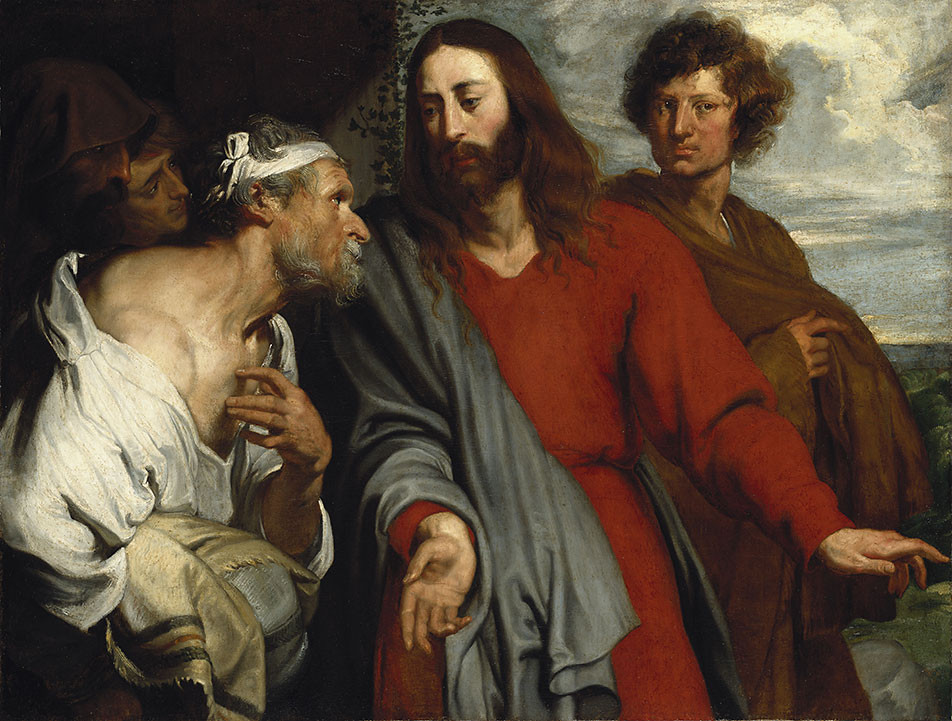Last edited on 25/Jan/2021
The Bible’s Answer
Introduction
If you have Christian friends or acquaintances who talk with you about their faith, then you have most likely heard them say things like only Jesus is the way to salvation, and that he is the Saviour of the world. The idea of having a Saviour sounds nice and comforting, but what exactly does Jesus save us from, and why do we need to be saved in the first place? These are questions that we need to ask and know the answer to; otherwise there is no point in believing in Jesus in the first place.
Jesus Saves Us from Our Sins
The Bible says that Jesus saves us from two things. The first thing Jesus saves us from is our sins. The angel proclaimed to Joseph, the husband of Mary (Jesus’ adopted father on earth):
She will bear a son, and you shall call his name Jesus, for he will save his people from their sins. (Matthew 1:21)
Sin is any type of wrongdoing (1 John 5:17); it hurts God and all those whom we wrong. It is the act of transgressing God’s commandments (1 John 3:4). The Bible teaches that every human has sinned (Romans 3:23), and that sin has consequences. Sin is the cause of death and suffering in the world (Romans 5:12, 15–17; Romans 6:23). By sinning, we have invoked upon ourselves God’s wrath and condemnation:
For the wrath of God is revealed from heaven against all ungodliness and unrighteousness of men, who by their unrighteousness suppress the truth. (Romans 1:18)
Put to death therefore what is earthly in you: sexual immorality, impurity, passion, evil desire, and covetousness, which is idolatry. 6 On account of these the wrath of God is coming. 7 In these you too once walked, when you were living in them. 8 But now you must put them all away: anger, wrath, malice, slander, and obscene talk from your mouth. (Colossians 3:5–8)
One day everyone will have to give an account of their lives to God (Romans 3:19). We will give account for every thought (Romans 2:16), word (Matthew 12:36–37), and deed (Romans 2:5–6), both good and evil.
But because of your hard and impenitent heart you are storing up wrath for yourself on the day of wrath when God’s righteous judgment will be revealed. 6 He will render to each one according to his works: 7 to those who by patience in well-doing seek for glory and honor and immortality, he will give eternal life; 8 but for those who are self-seeking and do not obey the truth, but obey unrighteousness, there will be wrath and fury. 9 There will be tribulation and distress for every human being who does evil, the Jew first and also the Greek, 10 but glory and honor and peace for everyone who does good, the Jew first and also the Greek. 11 For God shows no partiality. (Romans 2:5–11)
As shown earlier, the Bible teaches that everyone has sinned, and Jesus taught that Hell is a real place where unrepentant sinners go, and that it is eternal punishment (Matthew 25:41, 46). Hell exists because it is God’s punishment for breaking his laws, which were given for the benefit of humanity, and to keep unrighteous people and sin out of his eternal, holy kingdom in the life after death (Revelation 21:10–11, 27).
Jesus Saves Us from God’s Righteous Wrath
This leads us to the second thing Jesus came to save us from. Jesus came to save us not only from our sins, but also from the wrath of God, as shown in the Bible passages above (Romans 1:18; Colossians 3:5–8). He came to save us from God’s righteous and holy wrath against us because we have sinned and done what is evil in his eyes.
Because we are spiritually dead and children of wrath through our transgressions (sins) against God, and therefore God’s righteous wrath is already upon us (Ephesians 2:1–3), we cannot be justified by works of the Law on the day of judgement (Romans 3:20). We can try and be justified (declared righteous) before God through doing good works, and this could indeed lower the severity of our punishment (Luke 12:47–48), because some sins are greater than others (John 19:10–11), but it will not take away our eternal—and just—condemnation in Hell. The Bible says that whoever keeps the whole Law but fails in one point, has become accountable for all of it (James 2:8–11). As far as God is concerned, our good works are like polluted garments in his sight, because by trying to justify ourselves through good works it is as if we are trying to bribe him into accepting us despite our sins and evil (Isaiah 66:4). God would never accept the bribes of sinners, let alone bribes that are like polluted garments, just like any fair judge; however, he would accept the payment of a holy and righteous man on their behalf.
Jesus Christ, who is the divine and eternal Son of God (John 1:1, 14; Hebrews 1:1–3), fulfilled the Law of God on our behalf by living a holy, righteous, and blameless life without sin (Matthew 5:17; Hebrews 4:15; 1 Peter 2:21–22), and therefore he is the only man in the world who could pay for sins on our behalf. Jesus paid our sin ransom (a payment that releases one from captivity) (Mark 10:45; Titus 2:13–14) by taking our sins upon himself and then suffering and dying on the cross in our place (Colossians 1:19–23; Colossians 2:13–14; 1 Peter 2:24). God the Father poured all of his wrath against sin upon his Son, who bore our sins (Isaiah 53:10–11; Isaiah 53:4–6), and his sacrificial death (Ephesians 5:2) satisfied his holy and righteous wrath forever (1 John 2:1–2; Hebrews 10:10) (a propitiation is an offering that satisfies wrath). Jesus’ sacrifice has made reconciliation between God and humankind possible (Romans 5:9–11). God raised him from death on the third day, which confirms that everything he said and did is true (Luke 24:46–48; Acts 2:29–32), and this gives us the sure hope that one day we too will be raised in the same way, if we believe in Jesus and are united with him in baptism (which is God’s work, not ours) (Romans 6:3–5).
God promises that everyone who believes in his Son, Jesus Christ, as their Lord and Saviour, will be saved from punishment and have eternal life (John 3:16), and that instead of being children of wrath, we will become adopted children of God by the indwelling of the Holy Spirit (Romans 8:14–16), who seals us for the day of redemption and guarantees our inheritance of Heaven (Ephesians 4:30; Ephesians 1:13–14). We can receive this promise through faith in Jesus Christ (Romans 3:21–26) as a free gift (Romans 5:15–17), because he has already earned it through his own merits alone, and his suffering and death on our behalf, for all who believe. The cost of our salvation was his holy and precious blood:
And if you call on him as Father who judges impartially according to each one’s deeds, conduct yourselves with fear throughout the time of your exile, 18 knowing that you were ransomed from the futile ways inherited from your forefathers, not with perishable things such as silver or gold, 19 but with the precious blood of Christ, like that of a lamb without blemish or spot. (1 Peter 1:17–19)
God Is a God of Love
Although Jesus does deliver every Christian from the wrath to come (1 Thessalonians 1:9–10), and God’s wrath is powerful and his expectations are perfection (Matthew 5:48), there is more to the nature of God than his holiness and separation from sin and impurity. God’s anger may be powerful, but it only lasts for a moment, while his favour, on the other hand, lasts for a lifetime (Psalm 30:5). He is slow to anger, gracious, merciful, faithful, (Psalm 86:15), and his steadfast love endures forever (Psalm 118:1). God’s love is so great and profound that the Bible says “God is love” (1 John 4:16). In his great love for all people, God sent us his Son to be the atoning sacrifice for our sins (John 3:16–18). It is not God’s desire to punish anyone, even though we deserve it (Ezekiel 18:30–32; Ezekiel 33:11); instead, he wants everyone to be saved by believing in his Son and to come to repentance (1 Timothy 2:3–4; 2 Peter 3:9). (Repentance is when you change your mind about sin and Jesus as a result of godly sorrow, viewing sin as a violation of God’s Law, and Jesus as God in the flesh, who takes away the sins of the world. Genuine repentance produces a change of action.)
Jesus said that the greatest act of love is to die for another person (John 15:13). The true extent of God’s love can be seen in Christ’s death on the cross, where he did not die for the godly, or righteous, but for the ungodly, and the unrighteous; for every human who has ever lived and who ever will live, even those who crucified him:
For while we were still weak, at the right time Christ died for the ungodly. 7 For one will scarcely die for a righteous person—though perhaps for a good person one would dare even to die— 8 but God shows his love for us in that while we were still sinners, Christ died for us. (Romans 5:6–8)
The Bible teaches us that the love of God in Christ Jesus our Lord is everlasting, and that no one who becomes a Christian and believes in Jesus can be separated from his eternal love:
Who shall separate us from the love of Christ? Shall tribulation, or distress, or persecution, or famine, or nakedness, or danger, or sword? 36 As it is written, “For your sake we are being killed all the day long; we are regarded as sheep to be slaughtered.” 37 No, in all these things we are more than conquerors through him who loved us. 38 For I am sure that neither death nor life, nor angels nor rulers, nor things present nor things to come, nor powers, 39 nor height nor depth, nor anything else in all creation, will be able to separate us from the love of God in Christ Jesus our Lord. (Romans 8:35–39)
We should not use God’s love as a reason for downplaying the severity of sin and God’s wrath against sin and sinners, but we should also not use God’s wrath and holiness as a reason for downplaying his love and forgiveness. The fact is that God is both a God who hates evil and punishes evildoers, and a God who loves sinners and who constantly gives us forgiveness and mercy. In order for God to be truly loving, he must also be just, and punish sinners.
Conclusion
The only one who can truly save us from the righteous, holy wrath of God against us because of our evil and wrongdoing, is the sinless, divine Son of God, Jesus Christ. If you truly want to be saved, then trust in Jesus alone for your salvation (John 3:16; Acts 4:12). Acknowledge your sins, believe in what Jesus has done for you on the cross and in his resurrection, and ask him for forgiveness.¹ The Bible tells us that salvation is as simple as receiving the grace of God through faith in Jesus Christ, and nothing else (Ephesians 2:8–9).
Since, therefore, we have now been justified by his blood, much more shall we be saved by him from the wrath of God. 10 For if while we were enemies we were reconciled to God by the death of his Son, much more, now that we are reconciled, shall we be saved by his life. 11 More than that, we also rejoice in God through our Lord Jesus Christ, through whom we have now received reconciliation. (Romans 5:9–11)
Notes
1. Confessions and prayers are not to be understood as the means by which we are saved, but rather as the proper expressions of faith that result from salvation. Faith alone is what receives the benefits of the saving grace of God.
All scripture quotations are from The Holy Bible, English Standard Version Copyright © 2001 by Crossway Bibles, a division of Good News Publishers unless specified otherwise.






